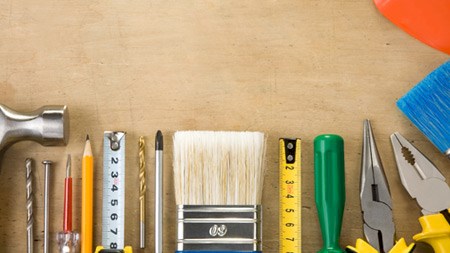You need a well-stocked toolbox to complete DIY projects around the house. Here’s a list of essentials that you should have.
When it comes to getting the job done properly, there’s nothing quite like a well stocked tool box. But don’t be fooled, just as much as a bad workman may perhaps blame his tools, a few good tools are really all you need – for the basics that is.
When it comes to shopping for tools though, don’t be fooled by smooth-looking “professional kits”. While they may seem to contain everything you could possibly want as well as many things you have no idea how to use, if they are not produced by a very reputable brand they often offer a compromise on quality in the interests of variety. Unless you really know what you are doing, the best advice is to make up your own tool box piece by piece. Here’s a list of basic start-up requirements that will go a long way towards meeting your toolbox needs:
Claw hammer: Choose a hammer with a solid handle that is securely set into the hammer head – look for a good fibreglass or strong metal setting. A solid wooden, heavy tubular steel or firm fibreglass handle is recommended. Stay away from lightweight wooden or flimsy tubular steel handles as these often separate from the hammer head. Make sure the hammer has a good claw too, as this allows you to do much more with the tool. Check guarantee and warranty periods on the brands that interest you.
Screwdrivers: You’ll need 6 screwdrivers for most of your woodwork and DIY, so spend some time selecting 6 of the best and you’ll probably never have to buy a screwdriver again. Rule of thumb when selecting screwdrivers: buy a reputable brand that comes with a good guarantee. Screwdrivers manufactured in lower grade metals tend to get damaged tips very quickly. Make sure the screwdriver handles are comfortable and offer a good grip – slim handles are usually harder to work with, and short handles offer less leverage.
You’ll need: Phillips (or star) no.0 - for most remote controls and children’s toys. Phillips (or star) no.1 - for hinges, and general household fittings. ELS 3.5 x 75 - for plug tops and electrical fittings. ELS 4 x 100 - the general dogsbody of screwdrivers. ELS 4 x 150 - the extra length of this tool allows access to difficult, hard-to-reach places. ELS 6 x 100 - use the bigger tip of the No 6 to avoid ruining soft screw-heads or the tips of smaller screwdrivers. The extra width also allows for added leverage in tight situations.
Pliers: As with screwdrivers, buy a reputable brand and a comfortable handle.
You’ll need: 200mm combination - grips and cuts, invaluable when you need to undo something small. 150 mm diagonal - for the bigger jobs.
Tape measure: Choose a tape measure that is at least 19 mm wide and 5 m in length. They stay firm instead of flopping when they are held out, making measuring a lot easier. They also don’t whip back too quickly when they are rewound.
Spirit Level: A good spirit level will have three measures to accommodate horizontal, vertical and diagonal measuring. Always check that all three offer correct readings in the shop before purchase. It is advisable to buy a longer (800cm plus) spirit level as this facilitates more accurate readings. Remember when buying a spirit level that wood warps over time, especially in humid climates.
A utility or Stanley knife: A vital and useful part of every tool kit. Originally produced by Stanley – from where they got their name – this brand still offers top quality knives. Buy a knife with a retractable blade, and always retract it after use – the blades are very sharp and can give deep cuts if accidentally touched or dropped.
Toolbox – A good quality plastic 40 cm toolbox will give you all the space you need to store the above-mentioned tools. Choose a box with extra trays and compartments on top to keep all the nuts and bolts that accumulate and check the quality of the joints and clasps when choosing.





